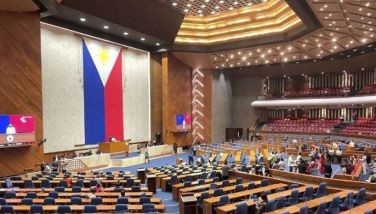ERC, Meralco ask SC to reverse order nullifying rate hike
February 21, 2006 | 12:00am
The Manila Electric Co. and the Energy Regulatory Commission asked the Supreme Court yesterday to reverse its Feb. 2 ruling which nullified the ERC’s June 2, 2004 order allowing Meralco to increase power generation rates by 0.1327 centavos per kilowatt-hour.
In a 49-page motion for reconsideration filed through its lawyers led by Manuel Torres, Meralco said the publication requirements under Section 4 (e) of the Rule 3 of the implementing rules and regulations (IRR) of the Electric Power Industry Reform Act (Epira) are not applicable to the Generation Rate Adjustment Mechanism (GRAM).
Meralco said the SC must make a distinction, adding that the context of the Epira IRR in the June 15, 2004 SC ruling on the Freedom from Debt Coalition, et al vs the ERC case indicated that the "rate adjustment" referred to is a general rate revision, which involves increases in the rates pertaining to the distribution, supply and metering charges.
"In such a proceeding, a myriad of verifications are conducted by the regulatory agency (ERC), i.e., the determination of the assets that are to be included in the rate base and which are entitled to return, the expenses that are allowed to be recovered in the rates and specifically, the level of rate of return that the utility is to obtain," Meralco said.
Meralco said a wide latitude of discretion is exercised by the regulator in resolving a general rate revision — granting the application of the utility in toto, or at a reduced level of rate relief or, if warranted, entirely denying the application.
On the other hand, Meralco said the "adjustment" arising from the implementation of the GRAM merely represents Meralco’s recovery of an increase in the cost of purchased power, reckoned from a base cost. — Jose Rodel Clapano
In a 49-page motion for reconsideration filed through its lawyers led by Manuel Torres, Meralco said the publication requirements under Section 4 (e) of the Rule 3 of the implementing rules and regulations (IRR) of the Electric Power Industry Reform Act (Epira) are not applicable to the Generation Rate Adjustment Mechanism (GRAM).
Meralco said the SC must make a distinction, adding that the context of the Epira IRR in the June 15, 2004 SC ruling on the Freedom from Debt Coalition, et al vs the ERC case indicated that the "rate adjustment" referred to is a general rate revision, which involves increases in the rates pertaining to the distribution, supply and metering charges.
"In such a proceeding, a myriad of verifications are conducted by the regulatory agency (ERC), i.e., the determination of the assets that are to be included in the rate base and which are entitled to return, the expenses that are allowed to be recovered in the rates and specifically, the level of rate of return that the utility is to obtain," Meralco said.
Meralco said a wide latitude of discretion is exercised by the regulator in resolving a general rate revision — granting the application of the utility in toto, or at a reduced level of rate relief or, if warranted, entirely denying the application.
On the other hand, Meralco said the "adjustment" arising from the implementation of the GRAM merely represents Meralco’s recovery of an increase in the cost of purchased power, reckoned from a base cost. — Jose Rodel Clapano
BrandSpace Articles
<
>
- Latest
- Trending
Trending
Latest
Trending
Latest
Recommended































